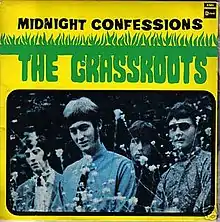Midnight Confessions
"Midnight Confessions" is a song written by Lou T. Josie and originally performed by the Ever-Green Blues. It was later made famous by American rock band The Grass Roots, who released the song as a single in 1968. Though never released on any of the group's studio albums, it was on their first compilation album, Golden Grass, and has been included on many of their other compilations since.
| "Midnight Confessions" | ||||
|---|---|---|---|---|
 | ||||
| Single by The Grass Roots | ||||
| from the album Golden Grass | ||||
| B-side | "Who Will You Be Tomorrow" | |||
| Released | June 1968[1] | |||
| Recorded | 1968 in Los Angeles, California | |||
| Genre | Rock, psychedelic pop | |||
| Length | 2:42 | |||
| Label | ABC/Dunhill | |||
| Songwriter(s) | Lou Josie | |||
| Producer(s) | Steve Barri | |||
| The Grass Roots singles chronology | ||||
| ||||
The Grass Roots version became the band's biggest charting hit on the Billboard Hot 100, reaching the Top 5 of both the U.S. and Canadian pop singles charts.[2] The lyrics describe a man who is infatuated with a married woman, knows he can never have her, and is relegated to confessing his love for her audibly, but alone.
Background and recording
The original recording of "Midnight Confessions" was a demo by the Evergreen Blues Band, whose manager – Lou Josie – wrote the song. The demo contained a horn section and caught the attention of Record producer/engineer Steve Barri, who was looking to produce a song for the Grass Roots that was a "West Coast" version of a Motown-style production. The Grass Roots version was produced/engineered by Steve Barri with the horn section's arrangement by Jimmie Haskell. The song's instrumentation was recorded by the group of LA studio-musicians known as the Wrecking Crew, as were many hits by The Grass Roots.[3][4] Rob Grill and Warren Entner shared lead vocals.
Release and reception
"Midnight Confessions" was released as a single by the ABC/Dunhill record label in late June 1968.[1] It was the Grass Roots' first single to feature a horn section and was a departure from the group's previous singles and thus caused worry for the band members as it might not have become a hit.[4] However, the single was well received and became their biggest hit in the United States, peaking at #5 on the Billboard Hot 100 on November 2, 1968,[2] and was certified gold by the Recording Industry Association of America, with sales of over one million units, on December 3, 1968.[5] The single also did well in Canada, peaking at #4 on the RPM 100 singles chart.[6]
Chart performance
Notable cover versions
- Patti Drew (c. 1968)
- Phyllis Dillon (c. 1968-71)
- Carolyne Mas (1980)
- Karla DeVito (1981)
- Fastbacks (1984)
- Rock City Angels (1989)
- Carol Lynn Townes (1993)
- Ron Dante of The Archies (1999)
- Paul Revere & the Raiders (2000)
- Lou Josie, solo album Me and Mother Music (2002)
- Phish (2011)
References
- Ackerman, Paul, ed. (June 29, 1968). "Spotlight Singles: Top 60 Pop Spotlight". Billboard. 80 (26): 95. Retrieved March 25, 2011.
- Whitburn, Joel (2010). "Chapter 1: The Artists". The Billboard Book of Top 40 Hits (9th ed.). Billboard Books. p. 276. ISBN 978-0-8230-8554-5.
- Hartman, Kent (2012). The Wrecking Crew. New York: St. Martin's Press. pp. 169–172. ISBN 978-0-312-61974-9.
- Everett, Todd (1996). All Time Greatest Hits (CD liner). The Grass Roots. MCA Records. MCAMD-11467.
- Gold & Platinum Searchable Database Archived 2007-06-26 at the Wayback Machine. Recording Industry Association of America. Type in "Grass Roots" under Artist to see search results.
- "The RPM 100" (PHP). RPM Weekly. 10 (8): 5. October 28, 1968. Retrieved March 25, 2011.
- "Image : RPM Weekly - Library and Archives Canada". Bac-lac.gc.ca. Retrieved 2016-05-24.
- "SA Charts 1965–March 1989". Retrieved 5 September 2018.
- [Joel Whitburn's Top Pop Singles 1955-2002]
- http://www.collectionscanada.gc.ca/rpm/028020-119.01-e.php?brws_s=1&file_num=nlc008388.5867&type=1&interval=24&PHPSESSID=mhe12pta2k83e08udtq66ot062
- "Top 100 Hits of 1968/Top 100 Songs of 1968". Musicoutfitters.com. Retrieved 2016-05-24.
- "Cash Box YE Pop Singles - 1968". cashboxmagazine.com. 1968-12-28. Retrieved 2016-05-24.